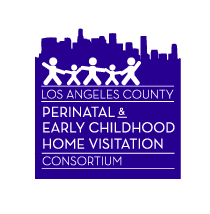Talking to Kids About ICE and Immigration
Immigrants are vital in LA, in California, and in the United States. Immigrants are our neighbors, friends, loved ones. Many families that are served by home visiting are immigrants, and they are scared. Children may be having an especially hard time coping and understanding the magnitude of what is happing in their communities. Stoking a culture of fear is nothing but harmful.
Parents may be unsure how to even begin to tackle explaining the situation. We have gathered some helpful tips and talking points for parents and caregivers to help assuage some of the fears kids have surrounding the ICE raids and mass deportation threats. We’ve also gathered compilations of children’s books that can be used to help explain the experiences of immigrants.
First and Foremost - Have a Plan
Having a family plan can help assuage fears about ICE encounters and deportation. The Immigrant Legal Resource Center has created a toolkit that goes into detail about different childcare options available in case of an absent parent, where to find trusted immigration services in your community, and how to prepare to assert your constitutional rights in the presence of an immigration officer. It is also important to share your plans with your kids, trusted friends and family members who may be able to step in in the absence of parents.
Neighborhood Legal Services of Los Angeles County is a valuable, trusted resource in our community. They have several resources that can be used to help Angeleno families plan for the future.
· NLSLA Family Preparedness Guide English | Spanish
· NLSLA Child Information Form English | Spanish
· NLSLA Bilingual Removal Defense Referral List
Talking Points for Kids
Tell the truth (gently). Be honest about the uncertainty of the moment, but reassure kids that you, and a lot of other caring individuals, are there for them. It is ok if you don’t have all the answers.
Validate their fears to build a sense of safety and trust. When they are ready to bring up their own personal fears, offer reassurance and understanding.
Use simple, age-appropriate language. Telling stories or using books and toys can help make it more understandable.
Encourage kids to ask questions. Tell them how you feel about the situation. Adults get scared too. Acknowledge that it is a tough topic, but that it is important to talk about it.
This fact sheet from the National Child Traumatic Stress Network offers guidance on how to talk with children about deportation or separation. It helps to guide family members, caregivers, as well as providers, on how to speak to children about these issues including, if it is appropriate to talk to children at all about such things and how to use analogies to explain the idea of deportation and separation.
Books for Children About Deportation and Immigration
Using books and stories is a great way to help kids gain a better understanding of what is happening in their own lives. Here are some compiled lists of recommended books for parents to read to their children to explain immigration and deportation.
Social Justice Books: Teaching About Immigration
Below are titles we recommend on immigration policy and politics, the immigrant experience, and human displacement due to many factors, including climate injustice, capitalism, and militarism, with a focus on the United States.
Colorin Colorado: Tough Topics for Kids: Family Separation
These stories address difficult topics around family separation. Many relate to immigrant stories (both historic and contemporary). These books can be a powerful tool in helping children talk about their feelings and experiences during or after a separation.
Avery and Augustine: 50+ Children’s Books About Immigration and the Immigrant Experience
This page features picture books about immigration and immigrating to another country. Uprooting your life and moving to another country can be a sad experience, also scary at times. But there are moments of joy when you find home; when you settle in to a new community, and it embraces you with open arms. We’ve included titles about migrants and refugees as well.
Brightly: 18 Books for Kids About the Immigrant Experience in America
We live in a nation of immigrants. But what does that mean to a 3-, 6-, or 12-year-old? Maybe they’ve heard about the wall that the president wants to build between the U.S. and Mexico. Or the proposed ban on Muslims entering the United States. Maybe they know someone who recently immigrated to the U.S. — and who is struggling to fit in. Maybe immigration is part of their family’s story — or their own.
Additional Resources
Our LA Best Babies Network Communications team gathered a list of trusted resources for immigrant families in L.A County- all from local organizations.
Link to resources: https://welcomebaby.labestbabies.org/support-and-resources-for-immigrant-families-in-los-angeles-county/
